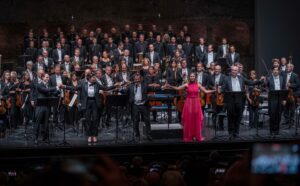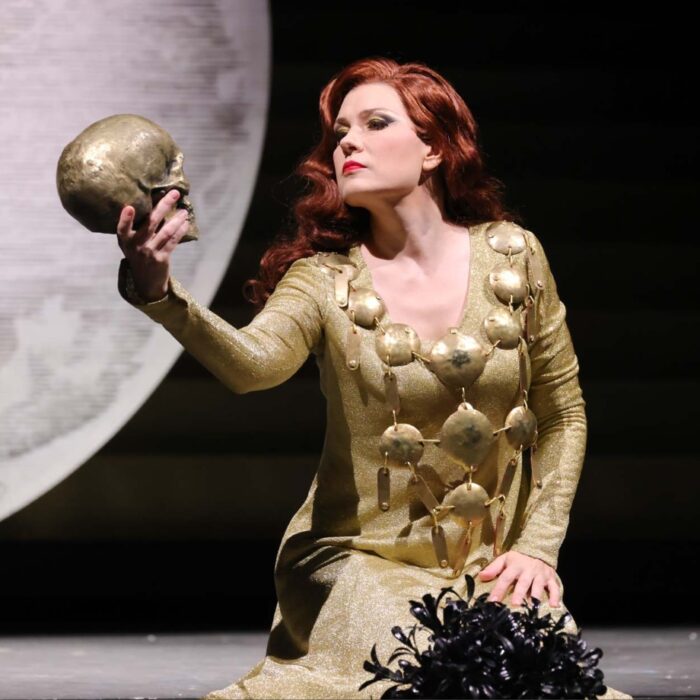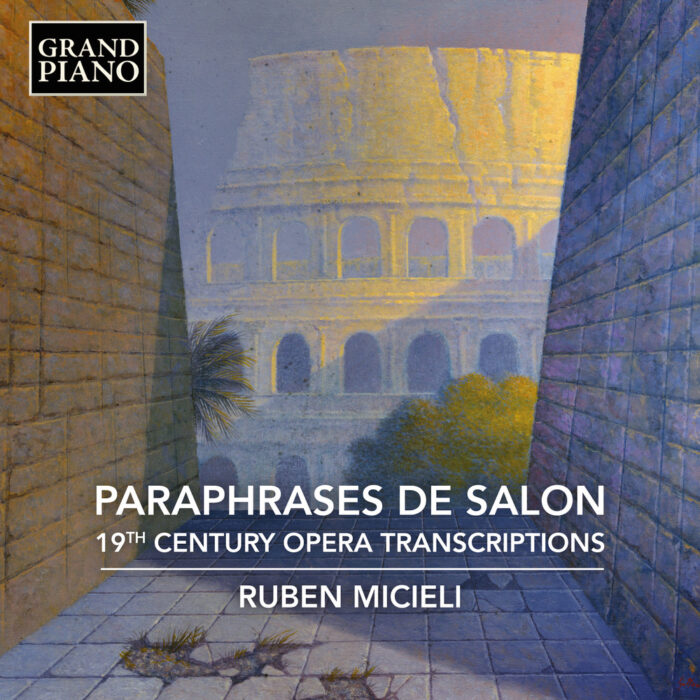
Salzburg Festival 2023 Review: I Capuleti e i Montecchi
By João Marcos Copertino(Photo: ©SF Marco Borrelli)
It is believed that there are no bad orchestras, just bad conductors. Following this rationale, Marco Armiliato conducting my high school orchestra in David Gefffen Hall would be greeted with rave reviews. It is not that he wrung water out of stones—this miracle belongs exclusively to Moses’s staff. But, he did lead Salzburg’s Mozarteum Orchestra to a more proper operatic sonority than the fancier orchestras that are headlining Salzburg Festival. In Bellini’s “I Capuleti e i Montecchi” concert version, everything leaned towards bel canto and nothing else, just as it was supposed to.
The orchestra had its share of flaws. The strings were a bit too opaque and once or twice the flutes were almost in tune. The horns did not fully play together with the singers. Nevertheless, Armiliato imposed a heavy percussive sound, almost fanfare. This made the tragedy foretold by the opera almost impossible to predict in its prelude. Here we have a Juliet who jeopardizes her own desire in the name of familial duty. Under Armiliato, the orchestra made clear the distinction between Bellini’s approach to the love story of Romeo and Juliet and the tradition surrounding the Shakespearean version.
Mixed Leads
This is the second time this summer that Elsa Dreisig has performed as Juliet. In June, she sang Gounod’s “Roméo et Juliette” for Opéra National de Paris. Her coloraturas were always marked by the great willfulness within Juliette’s spirit. In Bellini’s score, Juliette was a bit more congenial to her voice. She incarnates Bellini’s version of the heroine as vocally willful and determined. Her voice shows great strength and projection in the high notes. Her tight vibrato might be an acquired taste for some, but it did not prevent her from giving musical fluidity to Juliet. This was a very solid performance and a performer who has proven to be extremely professional. Her synchrony with Romeo was not as good as in Gounod—it seemed like they came together only when the first act was about to end. Together, they were clearly searching for a common sonority.
Mezzo-soprano Aigul Akhmetshina has one of the most beautiful mezzo tones that I have recently heard. The young singer’s instrument projects well from the gigantic stage of the Felsenreitschule. Her voice has a sense of warmth and roundness, some might say meatiness, that is very impressive. I believe the warm reception of the Salzburgian audience to her performance came first and foremost because the vocal work was so strong and in a Bellinian score that showcases how beautiful voices can sound. That said, Akhmetshina still has a ways to go in matters of her expression. She sang Romeo with less nuance and color than her voice seemed able to convey. She hardly transitioned to softer tones. Everything was sung at mezzo piano. She never yelled or cried. Careful work with a pianist or a conductor would lead her towards developing her full potential. Moreover, Romeo was a very charming role for her. Although this was only a concert version of the opera, Akmetshina wore a suit on stage. It was nice to see a singer who cares about the much-needed androgyny of this role.
Different Spectrum of Vocal Singing
In a different spectrum of vocal singing, tenor Giovanni Sebastiano Sala was an efficient Teobaldo. His well-trained voice shows some guttural restriction when leading to the higher notes. The tenor has a lyric instrument that, in my opinion, sounded a bit more stressed than ideal for Bellini’s musical lines. Nevertheless, Sala is competent in his tasks. He had the most expressive approach to language of the night. His aria in the first act, “È serbata a questo acciaro,” was attentive to text and recitation with proper pauses and respirations that made Teobaldo more charismatic than usual.
Roberto Tagliavini was a great surprise as Lorenzo. He is close to being an ideal bass for the Italian repertoire. He has a very full and solid voice with inclination to the low notes that rarely obstructs the legato line. There were no moments when his vocal projection compromised, nor was the text, for that matter. His interpretation of Lorenzo is extremely political—maybe, along with Dreisig’s Juliet. This is the most explicit statement about how “I Capuleti e i Montecchi” refutes any relation to Bard’s play.
Michele Pertusi lent his cadaverous voice to Capelio, an unforgiving father. The bass seemed to struggle in making his voice sound focused, or to project, for that matter. Nevertheless, the sonority of the patriarch was there, and to be fair, it is a smaller role in the masculine constellation of the opera.
Also in search of a sonic masculinity was the all-male Philharmonia Vienna Choir. The voices were very audible and proper, but in their sonority a certain strength was absent. The sound was often a bit juvenile and was missing the lower harmonics that make Italian opera choirs so striking, even in the early 19th century repertoire.
Although not a flawless spectacle, I was extremely satisfied with this “I Capuleti e i Montecchi.” In such an unassuming concert version of the opera, most of the qualities of Bellini’s score appear. Salzburg Festival sets a very high bar for operas and their staged productions. Sometimes, the greatest pleasures rely precisely on very simple approaches to opera’s music, voice, and text! But above all, music.


